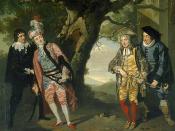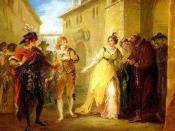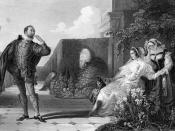'Twelfth Night', or 'What You Will' as it is sometimes called, was written in 1600. Much of the comedy in 'Twelfth Night' is due to the love interests of the higher classes, for example Olivia and Orsino and the behaviour of the less elevated, for example Malvolio. In 'Twelfth Night' hypocrisy and affection are ridiculed and some scenes highlight contrasts between ambition and actual achievement, this is often the case with Malvolio. Shakespeare's comedies (for example 'Twelfth Night') have many things in common, for example they often have a Mediterranean setting; in the case of 'Twelfth Night': Illyria. They also often have disguise (Viola dressing up as Cesario) and often main characters have a high social status, in 'Twelfth Night' this is the case with Olivia and the Duke Orsino. In 'Twelfth Night' some of the characters are serious, like Orsino, but some are comic, like Sir Andrew and Sir Toby.
In the case of Malvolio and Sir Andrew Aguecheek they are funny because of their idiotic behaviour; they don't try to be funny. The other comic characters are 'clowns', like Sir Toby Belch and Maria who are witty at the expense of others. Shakespearian comedies often end with happiness for the serious characters; this is often marriage like the marriage between Viola and Orsino. However the ending for the comic characters is often not so happy, like Malvolio. Malvolio becomes the focus of a lot of 'Twelfth Night's humour because he is very pompous and he always looks down on the servants lower than himself. Malvolio was an easy target for tricks and jokes (for example the letter sent by Maria and Sir Toby) as he can be fooled very easily. Malvolio hates it when people get the better of him, so he hates being tricked.
Malvolio is portrayed...


